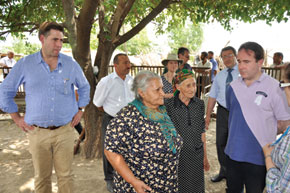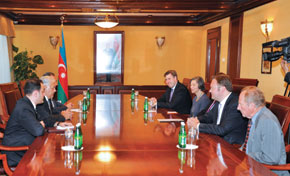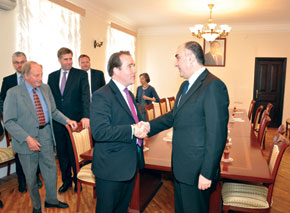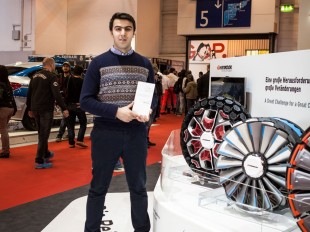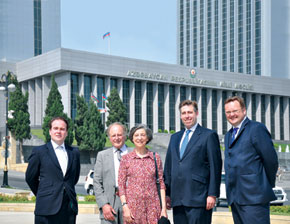 The Conservative Friends of Azerbaijan delegation at the Parliament building (from the left): Christopher Pincher, Viscount Eccles, Baroness Eccles, Graham Brady, Stephen Mosley.
The Conservative Friends of Azerbaijan delegation at the Parliament building (from the left): Christopher Pincher, Viscount Eccles, Baroness Eccles, Graham Brady, Stephen Mosley. In the last week of July, The European Azerbaijan Society invited a second delegation of British MPs, together with guests from the House of Lords, to Azerbaijan in as many months. This reflects ongoing efforts to raise knowledge and awareness, in the UK in general and in the UK government and parliament in particular, of Azerbaijan. All the guests this time are members of the Conservative Friends of Azerbaijan group: led by Christopher Pincher MP, the group included Viscount and Baroness Eccles and MPs Graham Brady and Stephen Mosley.
With barely a moment to draw breath during their visit, which involved lengthy trips through Azerbaijan´s interior, with temperatures in the high 30s, and back-to-back meetings in the capital city of Baku with top ranking Azerbaijani ministers and business people, the guests had already completed a full agenda by the time Visions staff caught up with them for interviews over dinner, on the last evening of their fact-finding visit.
The four busy days began in the regions, venturing on the first day to Qabala in the north to take in a day at the music festival which featured chamber music performed by young Azerbaijani classical singers and musicians. Further west the next day meant visits to the ancient Christian village of Nij, the picturesque Sheki and the Caucasian Albanian church in the village of Kish. While these first two days were mainly cultural in content, there was also a visit to an IDP (internally displaced persons) settlement for people driven out of their homes in Nagorno-Karabakh.
The return to Baku, included a visit to Martyrs’ Avenue, the last resting place of those killed by Gorbachev’s troops on 20 January 1990 in the death throes of the USSR and the catalyst for the restoration of Azerbaijani independence. Also buried there are the victims of Armenia’s invasion of Nagorno-Karabakh and surrounding districts in the early 1990s. The delegation also met with British ambassador to Azerbaijan, Carolyn Browne.
The final working day covered meetings with representatives of business and industry (telecommunications and oil), ministers (Foreign Affairs and Ecology & Natural Resources), parliamentarians (the Speaker and the UK-Azerbaijan Parliamentary Friendship Group) and government officials (heads of the State Oil Fund and International Relations).
Not at all what you would expect
Stephen Mosley MP had previously met Azerbaijanis at an international IT event in Lithuania. The Azerbaijanis had explained the exciting developments going on in Azerbaijan and the effect on IT of the money from SOFAZ (the State Oil Fund of Azerbaijan). So when he saw The European Azerbaijan Society stand at the Conservative Party Conference, he was immediately interested in finding out more and joined The Conservative Friends of Azerbaijan.
Even this brief trip had impressed him that it is an interesting country and he speculated that it would be great to stop over here on a holiday following the silk route, for example.
Christopher Pincher was enthusiastic about his second visit to the country, having originally been attracted by Azerbaijan’s potential role in providing energy security for Europe and enjoying the relaxed atmosphere: Not at all what you would expect from a Muslim state. He was struck this time by how much construction there had been since 2009: You can taste the sawdust! His comments supported Stephen Mosley’s view that you really have to see the country to understand its special character.
Business opportunities were high on Mr Pincher’s agenda, especially as the UK has a track record in the country as the major investor in Azerbaijani oil and gas:
Azerbaijan recognizes that oil and gas will be past the high point in 30 years and it needs to diversify. SOFAZ intend to build a fund of 200 billion AZN to support diversification into IT, telecoms and services and to build infrastructure for connectivity. UK skill and know-how can contribute here…. Eurovision is coming up and IT and the English language will be needed...
The trip to the foothills of the Caucasus also sparked thoughts of cooperation to mutual benefit:
When Qabala gets its airport, there will be big opportunities to attract tourists from Russia and Turkey, and the countryside could also bring in people from Western Europe; the Caravanserai [in Sheki] is beautiful – I’d recommend they go there rather than [building] high rise hotels. UK training could help polish up customer service.
Increasing interest
The delegation leader was also impressed by the visit to Nij and the respect shown to the villagers’ traditions and beliefs:
The church in Nij is carefully maintained and the Udi Christian community are grateful to the government for being allowed to practise their religion… and the church at Kish, once visited by Thor Heyerdahl, is still looked after by a woman who lives across the road… a good example of the Big Society and responsibility to the community.
Of course the visit to the IDP settlement was more painful and led on to some thoughts about the issue of the occupation of Nagorno-Karabakh:
It was very distressing to see people so far away from their homes, with no obvious hope of improvement, and conditions are very unpleasant. The government has moved to improve the situation, replacing the tents, railway wagons and shacks they used to live in; no government should tolerate such conditions. A settlement is needed. One million were displaced, most coming from the seven occupied regions; Armenia must accept it has no right to them, then move on to the thornier problem of Nagorno-Karabakh.
As Christopher Pincher said, the aim of the visit was to boost political and economic ties between Azerbaijan and Great Britain and become familiar with the realities of the Nagorno-Karabakh conflict, and we were keen to know how the experience of the visit would inform the group’s work back home.
There are 70 members of the Azerbaijan All Party Parliamentary Group, we’d like to increase their number and see more Azerbaijani MPs in London. There is increasing interest in the country and we’ll reinforce the message to the UK about the opportunities for business and also stress the challenges facing Azerbaijan; we have to take their concerns very seriously.
At that, we finally allowed the visitors to relax at the end of a hectic but rewarding and informative trip to the land of fire.
